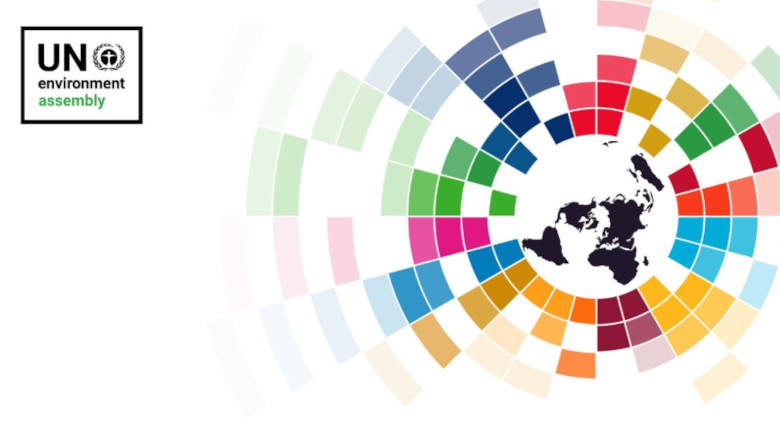Environmental and Climate Solutions Must Contribute to Poverty Eradication

The 6th session of the United Nations Environment Assembly (UNEA-6) takes place from 26 February to 1 March at the United Nations Environment Programme headquarters in Nairobi, Kenya. UNEA, the “World’s Top Decision-Making Body on the Environment” is focusing on the triple planetary environmental crisis: climate change, nature and biodiversity loss, and pollution and waste. For this 6th session, the theme will be: “Effective, inclusive and sustainable multilateral actions to tackle climate change, biodiversity loss and pollution.”
Disproportionate impact on people in poverty
ATD Fourth World wants to emphasise the importance of these issues and their disproportionate impact on people living in poverty worldwide. While they are the hardest hit by these problems, they are the least responsible for their causes.
The homes, harvests, lands, resources, and histories of those who already find themselves in a position of vulnerability are being destroyed by the effects of climate change, such as extreme weather events, rising sea levels and unpredictable climatic patterns. Simultaneously, polluted air, water and soil disproportionately impact impoverished neighbourhoods, usually situated in industrial and hazardous areas, exposing people to health risks.
The loss of biodiversity, intricately linked to the well-being of our planet, is another problem for those who are experiencing poverty. For communities dependent on natural resources for sustenance, the depletion of biodiversity disrupts essential ecosystems, jeopardising food security.
A human rights issue
Climate change, pollution and biodiversity loss are not abstract concepts but tangible threats to the daily lives and aspirations of individuals experiencing poverty, thus violating their human rights.
The right to a healthy, clean and sustainable environment, the right of every person to life, the right to access to water, the right to healthcare and the right to participate in decisions affecting one’s community, are integral components of a human rights perspective that must be woven into the fabric of global environmental policies.
Climate and environmental policies should include measures to eradicate poverty.
States have committed to implement Sustainable Development Goal 1 – which aims to “end poverty in all its forms everywhere”. This shows the internationally agreed importance of poverty eradication to advance towards greener and more just societies.
At UNEA-6, it is paramount to acknowledge the interplay of these challenges to develop comprehensive, inclusive and sustainable solutions that put people who are living in poverty at the forefront.
Eradicating poverty must be reaffirmed as an integral part of any new agreement as per the 2015 Paris Climate Agreement, and the Glasgow Climate Pact adopted in November 2021.
It is vital to remember that the Glasgow pact, the first global stocktake decision of 2023, and the UAE Just Transition Work Programme enshrines the need for “a just transition that promotes sustainable development and poverty eradication, as well as the creation of decent work and quality jobs”1.
To tackle climate change, biodiversity loss and pollution in an effective, inclusive and sustainable manner, national and multilateral actions must be taken.
ATD Fourth World puts forward these proposals:
- Tackle climate change, pollution and waste, and nature and biodiversity loss in partnership with people in poverty
People who live in persistent poverty are the first to be affected by climate change, pollution and biodiversity loss and only they can describe their experiences and needs. Systematic input from people living in poverty is essential to the design, implementation, and evaluation of public policies that will affect them. Their participation is crucial both to correct initiatives that may be ineffective and to reflect together on new and appropriate measures. Governments and international institutions must reach out to the people and communities most impacted by environmental issues, involving them as partners. This ensures that actions taken to address this crisis are inclusive. - Use the IDEEP tool
In partnership, the UN Special Rapporteur on extreme poverty and human rights and the International Movement ATD Fourth World, created a tool for the Inclusive and Deliberative Elaboration & Evaluation of Policies (IDEEP). This tool aims to guide decision-makers to ensure strong participation in the design, implementation and assessment of projects or policies that have impacts on people in poverty. - Ensure that financial resources reach people experiencing poverty first
The financial resources that will or have been already distributed to tackle climate change, biodiversity loss, pollution and waste intended to benefit the most vulnerable, often fail to reach people living in poverty and therefore are not working to change their lives. We advocate implementing a monitoring mechanism to ensure funds are directly allocated to the communities and their territories. Guaranteeing affected communities have direct access to these funds, prevents the loss of resources through intermediary actors. Consequently, the people impacted by these tragic events will actually receive the compensation they need to recover. - Place a special emphasis on the bottom 20% to make sure that no one is left behind
People and communities who experience poverty are usually made invisible in the context of policy making and diplomatic negotiation due to a lack of representation in the political and public debate spheres. Thus, a proactive approach is mandatory to analyse the specific effects of environmental change on these communities and how to prevent them. - Establish social protection floors in all countries
Stronger social protection, designed with the contribution of the people most affected by climate change, pollution and biodiversity loss, should be implemented in all countries, as encouraged by ILO Recommendation No. 202 on establishing social protection floors.
We urge the Member States to commit to poverty eradication during this summit – ATD Fourth World advocates to see enshrined in the final Agreement:
“Effective, inclusive and sustainable multilateral actions to tackle climate change, biodiversity loss, and pollution and waste have to contribute to poverty eradication.”

